GALLUP NEWS SERVICE
PRINCETON, NJ -- Last week's announcement that U.S. Supreme Court Justice Sandra Day O'Connor will retire has made her potential replacement the major domestic news story of the moment. Some estimates are that tens of millions of dollars will be spent in the intense lobbying effort from both sides as President George W. Bush ponders his choice to replace O'Connor on the bench. A number of recent Gallup polls have asked the American public about the issues involved in appointing a new justice to the court. What follows is a review of several key points derived from the results.
How Much Does the Next Supreme Court Justice Matter to Americans?
A recent CNN/USA Today/Gallup survey, conducted prior to O'Connor's retirement announcement, finds that nearly half of Americans, 48%, say the choice of a new Supreme Court justice matters a great deal to them. An additional 26% say it matters a moderate amount, and about one in four say it does not matter much (19%) or at all (7%).
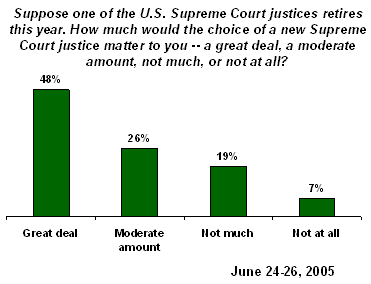
In general, the choice of the next Supreme Court justice appears to be most important to those who attend church weekly, to those who are politically or ideologically committed to one side of the political spectrum or the other (as opposed to moderates and independents), and to older Americans.
Conversely, the choice appears to be least important to those who are less likely to have strong opinions on politics, younger Americans, and those who seldom or never attend church.
More generally, at least half of the respondents in the following groups say the choice of a new justice matters a great deal to them: weekly churchgoers (57%), liberals (56%), conservatives (55%), weekly churchgoers who are white (55%), men aged 50 and older (54%), women aged 50 and older (52%), women (50%), Republicans (50%), and Democrats (50%).
|
How much would the choice of a new Supreme Court justice matter to you? |
|
|
June 24-26, 2005 |
|
|
Percentage saying |
|
|
% |
|
|
Weekly churchgoers |
57 |
|
Liberals |
56 |
|
Conservatives |
55 |
|
White weekly churchgoers |
55 |
|
Men, aged 50 and older |
54 |
|
Women, aged 50 and older |
52 |
|
Women |
50 |
|
Republicans |
50 |
|
Democrats |
50 |
|
Nearly weekly/monthly churchgoers |
49 |
|
All U.S. adults |
48 |
|
Women, aged 18 to 49 |
48 |
|
Men |
47 |
|
Independents |
45 |
|
Those who seldom/never attend church |
43 |
|
Men, aged 18 to 49 |
41 |
|
Moderates |
40 |
Groups for which the choice of the next justice does not matter as much include those who attend church on a semi-regular basis (49%), women aged 18 to 49 (48%), men (47%), independents (45%), those who rarely or ever attend church (43%), men aged 18 to 49 (41%), and moderates (40%).
The Impact of Abortion
Much of the attention being paid to the selection of a new Supreme Court justice is based on the potential for O'Connor's replacement to affect future court rulings on the controversial issue of abortion. More specifically, press accounts suggest that conservatives are energized by the prospect of a new justice overturning the Roe v. Wade decision, while liberals would appear to be greatly worried about exactly that same possibility.
Historically, only a minority of Americans have told Gallup that abortion should be totally illegal, while a majority says it should be legal under certain circumstances. Most recently, a June 24-26 Gallup poll found that 55% of Americans said abortion should be legal under certain circumstances, while 24% said it would be legal under any circumstances, and 20% said it should be illegal in all circumstances. The 55% who say abortion should be legal in some circumstances breaks down to 40% who say it should be legal in just a few instances, and 15% who say it should be legal under most circumstances.
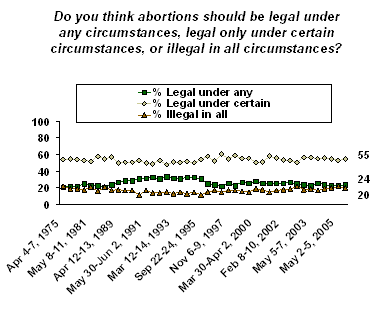
When asked specifically if they would want the new justice to vote to overturn Roe v. Wade or to vote to uphold that decision, Americans overwhelmingly would want that justice to uphold the decision (65%) rather than overturn it (29%).
In fact, less than a majority of most traditionally conservative groups favor overturning Roe v. Wade.
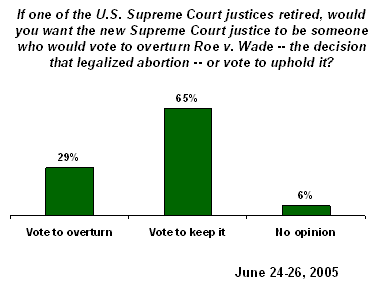
Three traditionally conservative groups of Americans -- while above average in wanting a new justice who would overturn Roe -- are essentially divided in their views about the decision: weekly churchgoers, regardless of race (49% of whom say overturn to 45% who say keep), conservatives (47% to 46%), and Republicans (46% to 47%).
White weekly churchgoers are more likely than any other group included in this analysis to say that they would want the new justice to vote to overturn Roe v. Wade -- but even among this group only 52% offer this response while 41% saying they would want to keep Roe v. Wade.
As the table below shows, at least 6 in 10 Americans in the rest of the demographic subgroups in this analysis would want the new Supreme Court justice to vote to uphold the decision.
|
If one of the U.S. Supreme Court justices retired, would you want the new Supreme Court justice to be someone who would vote to overturn Roe v. Wade -- the decision that legalized abortion -- or vote to uphold it? |
||
|
June 24-26, 2005 |
||
|
Vote to |
Vote to |
|
|
% |
% |
|
|
White weekly churchgoers |
52 |
41 |
|
Weekly churchgoers |
49 |
45 |
|
Conservatives |
47 |
46 |
|
Republicans |
46 |
47 |
|
Women, aged 18 to 49 |
32 |
64 |
|
Women |
31 |
64 |
|
Women, aged 50 and older |
30 |
63 |
|
All U.S. adults |
29 |
65 |
|
Men, aged 50 and older |
29 |
65 |
|
Nearly weekly/monthly churchgoers |
29 |
64 |
|
Men |
28 |
66 |
|
Men, aged 18 to 49 |
28 |
67 |
|
Democrats |
22 |
76 |
|
Moderates |
21 |
74 |
|
Independents |
21 |
71 |
|
Those who seldom/never attend church |
18 |
79 |
|
Liberals |
16 |
81 |
A More Liberal or More Conservative Court?
Do Americans want the U.S. Supreme Court to become more conservative, more liberal, or would they want to maintain its current political balance? Gallup's June 16-19 poll finds that 41% of Americans say they would like the court to become more conservative, while 30% would want it more liberal, and 24% would keep it as it is now.
Those Americans who are most likely to say they want the court to become more conservative include (not surprisingly) those who identify themselves as conservatives (71% more conservative to 8% more liberal), Republicans (64% to 10%), whites who attend church weekly (60% to 17%), and all Americans who go to religious services on a weekly basis (55% to 19%).
Those who are most likely to want the Supreme Court to become more liberal include self-defined liberals (70% more liberal to 10% more conservative) and Democrats (46% to 25%). Slightly more than a third of those who rarely or never go to church (37%), and younger men (36%) say they want the court to become more liberal.
One interesting note about partisan differences -- Republicans are more inclined to want the court to become more conservative than Democrats are in wanting the court to become more liberal.
|
Suppose one of the U.S. Supreme Court Justices retires at the end of this term. Would you like to see President Bush nominate a new justice who would make the Supreme Court -- [ROTATED: more liberal than it currently is, more conservative than it currently is] -- or who would keep the Court as it is now? |
|||
|
June 16-19, 2005 |
|||
|
More |
More |
Keep same |
|
|
% |
% |
% |
|
|
Liberals |
70 |
10 |
17 |
|
Democrats |
46 |
25 |
24 |
|
Those who seldom/never attend church |
37 |
30 |
27 |
|
Men, aged 18 to 49 |
36 |
37 |
26 |
|
Independents |
34 |
35 |
27 |
|
Nearly weekly/monthly churchgoers |
32 |
44 |
21 |
|
Men |
32 |
40 |
24 |
|
Moderates |
32 |
29 |
35 |
|
Women, aged 18 to 49 |
31 |
41 |
23 |
|
All U.S. adults |
30 |
41 |
24 |
|
Women |
28 |
42 |
25 |
|
Women, aged 50 and older |
26 |
43 |
26 |
|
Men, aged 50 and older |
25 |
46 |
22 |
|
Weekly churchgoers |
19 |
55 |
22 |
|
White weekly churchgoers |
17 |
60 |
20 |
|
Republicans |
10 |
64 |
23 |
|
Conservatives |
8 |
71 |
18 |
Views of Alberto Gonzales
Although Bush has given no official indication of whom he is considering nominating to replace O'Connor, some news reports have focused on long-time Bush friend Alberto Gonzales, the recently confirmed Attorney General of the United States. Some conservatives have expressed reservations about Gonzales (despite the fact that he is a Republican and closely tied to Bush) because decisions he made while serving on the Texas state Supreme Court are viewed as having favored abortion rights and affirmative action programs.
Currently, Gallup finds Americans view Gonzales more favorably than unfavorably -- by an almost two-to-one margin -- but half of Americans do not know enough about him to rate him.
Those who view Gonzales favorably include Republicans (44% favorable rating), conservatives (42%), and men (41% rating among older men, 39% among all men, and 38% among younger men).
Gonzales is viewed least favorably among Democrats, liberals, and women. There is thus no sign -- as of late June -- that conservatives and/or Republicans have anything less than the favorable opinion of Gonzales that would be expected, although this question did not ask specifically for opinions of a Gonzales nomination to the Supreme Court. It is important to note that a large percentage of respondents in these groups are unfamiliar with Gonzales.
|
Opinion of Alberto Gonzales |
|||
|
June 24-26, 2005 |
|||
|
|
|
Never heard of/ |
|
|
% |
% |
% |
|
|
Republicans |
44 |
5 |
51 |
|
Conservatives |
42 |
9 |
49 |
|
Men, aged 50 and older |
41 |
20 |
39 |
|
Men |
39 |
18 |
43 |
|
Men, aged 18 to 49 |
38 |
17 |
45 |
|
Nearly weekly/monthly churchgoers |
38 |
11 |
51 |
|
Independents |
34 |
19 |
47 |
|
All U.S. adults |
32 |
17 |
51 |
|
Moderates |
31 |
16 |
53 |
|
Those who seldom/never attend church |
31 |
20 |
49 |
|
Weekly churchgoers |
30 |
17 |
53 |
|
White weekly churchgoers |
30 |
16 |
54 |
|
Women, aged 18 to 49 |
27 |
14 |
59 |
|
Women |
26 |
15 |
59 |
|
Women, aged 50 and older |
24 |
17 |
59 |
|
Liberals |
20 |
34 |
46 |
|
Democrats |
20 |
25 |
55 |
What Will Bush and the Democrats in the Senate Do?
Over the past few weeks, Gallup has asked Americans several questions about what the Republicans and Democrats might do in the process to appoint a new Supreme Court justice.
- Roughly two in three Americans say it is at least somewhat likely that the president would appoint someone to the court who would let his or her religious beliefs inappropriately influence his or her legal decisions. About a third say this is not likely.
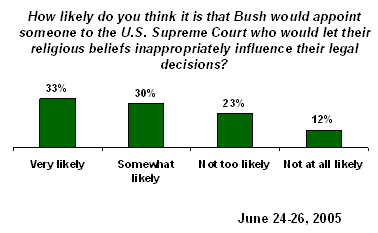
- More than 8 in 10 Americans say it is very (58%) or somewhat (28%) likely that the Democrats in the Senate would attempt to block Bush's nominee for inappropriate political reasons. Twelve percent say this is not too or not at all likely.
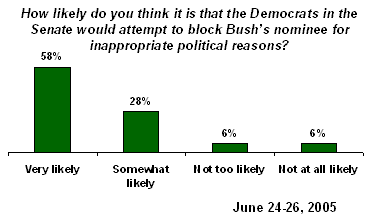
- Earlier in June, Gallup asked a question about what Bush should do if he nominates someone that he thinks is the best person for the job but that almost all the Democrats in the Senate oppose because of that nominee's stance on important issues. A slim majority of Americans in that poll, 51%, say Bush should nominate another person who the Democrats find acceptable in this instance, while 46% say he should still nominate that person.
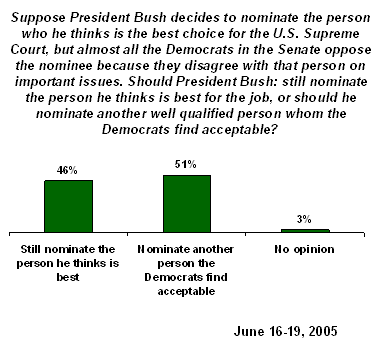
- Another question in that mid-June poll asked Americans about what the Democrats in the Senate should do if they oppose Bush's nominee because they disagree with that person on important issues. A slight majority of Americans, 53%, say the Democrats in the Senate should work to defeat the nomination, while 40% say they should vote to confirm the nominee.
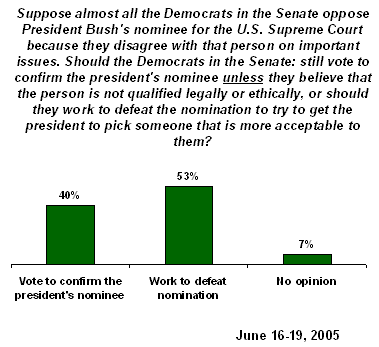
Survey Methods
These results are based on telephone interviews with a randomly selected national sample of 1,009 adults, aged 18 and older, conducted June 24-26, 2005. For results based on this sample, one can say with 95% confidence that the maximum error attributable to sampling and other random effects is ±3 percentage points. In addition to sampling error, question wording and practical difficulties in conducting surveys can introduce error or bias into the findings of public opinion polls.
